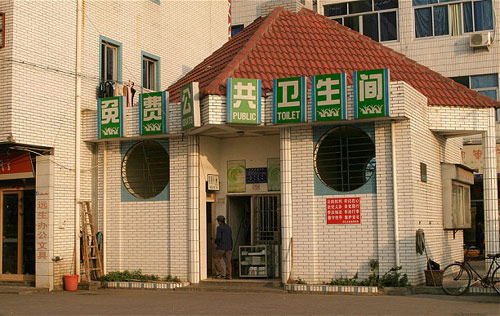|
查看原文
For the uninitiated, entering a public lavatory in China can be a horrifying experience.
In smaller cities, or the countryside, the sight of an open trench filled with excrement, coupled with a suffocating stench of sulphur and ammonia, is often enough to send even the bravest tourist whimpering back to their hotel.
In the 1990s, a third of all complaints to tourism officials in Beijing concerned the design, and odour, of public lavatories.
China has battled stinky loos for at least 2,000 years. In the Kingdom of Wei (220-265AD), visitors to the palace bathrooms would find boxes of dates to stuff up their noses and ward off unpleasant odours.
However, both flushing lavatories and toilet paper were invented in China, although only initially for the use of the emperor.
Today, however, Chinese scientists have claimed victory in their battle to improve public rest rooms, unveiling a bacterial spray that can, they say, almost eliminate the smell of putrefaction.
First, a set of six strains of bacteria work to break down the odorous compounds and then a perfume made from orange peel lightly scents the air.
The "smell-free lavatory" study from the Chinese Academy of Science was declared the "ultimate" cure to an "urgent" national issue.
"Five scientists have worked on this from 2011 to the beginning of this year," said Dr Yan Zhiying, a bacteriologist with the academy's Chengdu Institute of Biology, adding that they had spent £140,000 on the project.
"Some local government officials here visited a sewage plant and saw that the treatment technology had come from Japan. They wanted a home-grown solution so they asked us to work on it," he added.
"We extracted bacteria from all type of excrement, human, pig, chicken and duck, and we tested our compounds one by one," he said.
"The smells coming out of public lavatories, or cesspits, or rubbish tips, are made up of more than 160 different compounds," he explained, adding that their bacteria, including a strain from the lactobacillus, saccharomycetes and actinomycetes families, can convert and absorb many of them.
He boasted that the Chinese formula, which costs around £5 per litre, has no side effects and can be used to fend off the stench of any type of biological decomposition.
More recently, Beijing has waged a war to improve conditions in public lavatories, first introducing a star-rating and then, two years ago, drafting a rule that no more than two flies should be present in any of the city's facilities at the same time.
|
查看譯文
對外國人來說����,中國的公共廁所簡直是一場噩夢。
上世紀九十年代����,北京旅游管理處收到的三分之一的投訴都跟公共廁所的設計、氣味有關���。在一些小城市或者農村地區(qū)���,旱廁溝渠里暴露的糞便�����、以及令人窒息的氣味就足以讓最勇敢的游客哭著回旅館��。
2000多年以來�����,中國一直在和臭廁所作斗爭�。在魏朝(公元220-265年)�����,皇室?guī)膮⒂^者們也紛紛用紙盒掩鼻以抵擋臭味��。
然而��,沖廁和廁紙卻是由中國人發(fā)明�����,盡管最初只用于皇室。
現在����,中國的科學家說他們正在戰(zhàn)勝這種臭氣。他們推出了一種細菌噴霧���,并聲稱這種噴霧幾乎能完全消除廁所的腐臭味���。
這種細菌噴霧先是由一組六株細菌分解混合氣味,然后再釋放一種由橘子皮制成的香水氣味����。
中國科學院進行的這項“無味廁所”項目宣稱要從根本上解決中國的棘手問題。
“2001年到今年年初����,五位科學家一直致力于這項課題��,”嚴智英(音譯)博士說���。這位來自中國科學院成都生物研究所的細菌專家補充說���,這項課題已經花費了14萬英鎊(約149萬人民幣)���。
“一些地方官員在參觀污水處理廠時注意到處理技術來自日本,他們希望有本土的解決方法并希望我們?yōu)橹?����?��!眹姥a充����。
“我們提取了所有類型的糞便細菌��,包括人�����、豬�����、雞�、鴨的糞便,并逐個檢測了這些化合物”��。
“公廁、污水坑或垃圾堆散發(fā)的臭味由160多種化合物組成����,”他解釋道,“這些化合物中的細菌��,包括乳酸菌�、酵母菌以及放線菌族群,又能互相轉化和吸收”����。
他說這種中國配方,售價約5英鎊(約53元人民幣)每升�,沒有任何副作用,可以用來抵御任何類型生物分解的惡臭����。
近些年,北京發(fā)起了改善公廁環(huán)境的戰(zhàn)役��。先是引進廁所評級�����,然后在兩年前又出臺一項方案:任何設施不得同時有兩只以上的蒼蠅停留���。
(譯者 劉秦 編輯 丹妮)
掃一掃��,關注微博微信
 
|


